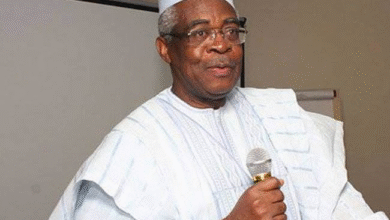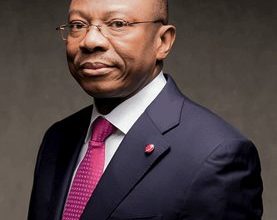NBS: Company income tax increased by 150.83% to N2.47trn in Q2 2024

Enugu IRS cracks down on tax defaulters, shuts down businesses
The National Bureau of Statistics (NBS) says the federal government generated a total of N2.47 trillion, from company income tax (CIT) in the second quarter (Q2) of 2024.
The NBS, in its Q2 CIT report published on Monday, said the amount increased by 150.83 percent from earnings in the first quarter (Q1).
The CIT is a tax on the profits of incorporated entities in Nigeria. It also includes the tax on the profits of non-resident companies operating a business in Nigeria.
In Nigeria, the CIT is charged at 30 percent for companies with more than N100 million in turnover — and 20 percent for companies with a turnover between N25 million and N100 million.
Advertisement
“On the aggregate, Company Income Tax (CIT) for Q2 2024 was reported at N2.47 trillion, indicating a growth rate of 150.83% on a quarter-on-quarter basis from N984.61 billion in Q1 2024,” the bureau said.
“Local payments received were N1.35 trillion, while Foreign CIT Payment contributed N1.12 trillion in Q2 2024.”
A sectoral analysis of the revenue on a quarterly basis showed that agriculture, forestry and fishing recorded the highest growth rate at 474.5 percent, followed by financial and insurance activities (429.76 percent) and manufacturing (414.15 percent).
Advertisement
Advertisement
“On the other hand, activities of households as employers, undifferentiated goods- and services-producing activities of households for own use had the lowest growth rate with -30.22% followed by activities of extraterritorial organizations and bodies with -15.67%,” the bureau said.
“In terms of sectoral contributions, the top three largest shares in Q2 2024 were Financial and insurance activities with 15.53%; manufacturing with 8.99%; and Information and communication with 7.84%.
“Nevertheless, the activities of households as employers, undifferentiated goods- and services-producing activities of households for own use recorded the least share with 0.00%, followed by water supply, sewerage, waste management, and remediation activities with 0.02% and activities of extraterritorial organizations and bodies with 0.03%.”
On a year-on-year basis, the NBS said CIT collections in the period examined increased by 59.52 percent from N1.55 trillion recorded in Q2 2023.
Advertisement
On June 4, Taiwo Oyedele, chairman of the presidential fiscal policy and tax reforms, said the committee proposed a reduction of the company income tax by 5 percent.
He said the tax rate should drop from 30 percent to 25 percent to encourage businesses and investors.
NEXTPHOTOS: Toyin Lawani styles Jamaican singer Spice in dollar note dress »
PREVIOUS« Mikel Obi: Osimhen didn’t demand £500,000-a-week wage… he reached a compromise with Chelsea
TAGS:
company income tax (CIT)NBS
RELATED POST
With N455bn, financial sector recorded highest contribution to CIT revenue in H1 2024
NBS: Company income tax increased by 150.83% to N2.47trn in Q2 2024
NBS: Nigeria generated N1.5trn from VAT in Q2 2024 — up by 9.11% from Q1
‘Economy on right trajectory’ — Tinubu reacts to GDP growth report
‘Oil output dropped, agric sector improved’ — what Q2 GDP figures say about Nigeria’s economy
Nigeria’s GDP grew by 3.19% in Q2 2024, says NBS
NBS: Prices of yam, garri, beans increased in July | South-south, north-central residents paid more
Price of diesel dropped to N1,379 per litre in July, says NBS
NBS: Kerosene price rose to N1,769 in July
NBS: Jigawa, Benue residents paid above N800 for a litre of petrol in July
All Rights ReservedView Non-AMP Version
This website uses cookies. Accept
Forex crisis threatens multimillion-dollar data centre investments in Nigeria
Nigeria records forex supply of $15.2 billion via official window
Data centre operators in Nigeria are grappling with the severe impact of the protracted forex crisis, which is now threatening millions of dollars in investments already sunk into building the facilities.
Industry stakeholders have raised concerns about the growing difficulty in attracting additional funding, as operators struggle to generate returns amid the worsening exchange rate instability.
The situation, they said, is further exacerbated by the unfavourable disposition of Nigerian banks towards investing in this type of business, which conditions the operators to continue to seek foreign investors.
The understanding is that Nigerian banks are unwilling to exercise patience for long-term investment, which is required for a data centre business.
Currency volatility is the biggest problem
Amid several other challenges such as power and other infrastructure required to facilitate the smooth running of a data centre, the operators said the instability of the Nigerian currency has now become the biggest problem.
News continues after this ad
News continues after this ad
According to the Chief Executive Officer of Digital Reality Nigeria, one of the leading data centre companies in Nigeria, Engr. Ikechukwu Nnamani, approximately 90% of the investment required to build a new data centre is in foreign currency as most of the equipment needed is not available locally.
Analysing how the forex crisis is discouraging foreign investments in the data centre business, Nnamani said:
“If you come to Nigeria and you use an exchange rate of N1500/$1 for instance, to benchmark what you want to charge and that amounts to $500 but you are charging in Naira for the use of your service, then by next year, Naira depreciates to N2000, if you convert back what you charge in Naira back to USD, you suddenly find out that you no longer selling your service at $500 but you are now selling it at $300 equivalent.
“So, your total business case, the basis of which you got investment, gets thrown out of the window, not because the customers are not there; not because the metrics under which you went into the business were wrong, but 100% based on the valuation of the naira, which unfortunately, you have zero control over because as a data center provider, you don’t have any influence on what happens to the exchange rate.”
Aside from the risk in foreign investment, Nnamani added that there is now a serious concern for data centre operators that set up their business with local investment.
“I think some of the data center players are going to run into big problems if they are not already in trouble,” he said.
MDXi, the Nigerian data centre business of Equinix, also lamented about Naira instability, noting that the headwinds have seen the cost of everything increase, from diesel to the installation and ongoing maintenance, parts replacement of the mechanical and electrical equipment required to run the data center – generators, UPS, air conditioning, fire protection, security surveillance, and other systems.
According to the Managing Director of MainOne, the parent company of MDXi, the Naira fluctuation has led to an increase in our operational expenses due to the higher costs of service contracts with OEMs and third-party vendors, ultimately impacting the data centre’s operational bottom line.
Foreign funding is still the only option
While noting that the only way around for data centre operators in Nigeria to survive is to benchmark their prices according to the Naira movement, Nnamani said foreign funding still remains the only option for the business as Nigerian banks want quick returns.
“The only kind of funds that can sustain this are long-term funding. People who can give you five to 10 years before they start looking at how to claw back their investment; that is the only players and sorts of funds that will be able to sustain this market.
“People that are not like the Nigerian banks, who want to put in money and get it back in two years time, that is not going to work because it’s just not sustainable,” he said.
Data centre gap
Meanwhile, despite the recent increase in the number of data centres in Nigeria, there is still a huge gap requiring more investments to bridge as the current capacity in the country is still very low compared to the country’s population and the volume of data being generated.
According to DC Byte, Nigeria currently ranks second in Africa for total Data Centre capacity, at 145 MW with 21% of the market capacity fully fitted out; far behind South Africa’s 408 MW.
This highlights the current gap in the country’s digital infrastructure.
However, there have been a few announcements of new data projects in the country, which if successfully completed could boost the country’s capacity.
The Chief Executive Officer of Open Access Data Centre (OADC), Dr. Ayotunde Coker recently told Nairametrics that the company is building additional 24 megawatts in two stages of 12 megawatts, two buildings of 12 each.
Digital Realty also recently announced its intent for a 10-megawatt capacity, while Airtel in March this year performed the groundbreaking of its 34MW Nxtra data centre in Lagos.
In June, MTN Nigeria also announced that it was building a 1,500-rack Tier 4 data centre to enhance Nigeria’s digital infrastructure.
While all these projects raise hope of increasing the country’s data centre capacity, the current forex instability still poses a threat to their completion.
Why it matters
Through the National Digital Economy Policy and Strategy (NDEPS 2020-2030), Nigeria is pushing for an economy that is fully digitised by the year 2030.
By that time, all government services are expected to be accessible online such that the citizens would not need to be physically present in any government office for its services. This requires standard data centres with huge capacity to sustain.
Aside from the drive to take all government services to the internet, virtually all businesses now require a server to store their data and such servers need to be accessible 24/7, which can only be achieved by hosting with a tier 3 data centre.
The growing fintechs and startups ecosystem needs a vibrant data centre to survive. Until now, many of such ventures host their data outside the country as the fear of reliability and scalability forces businesses to look elsewhere



